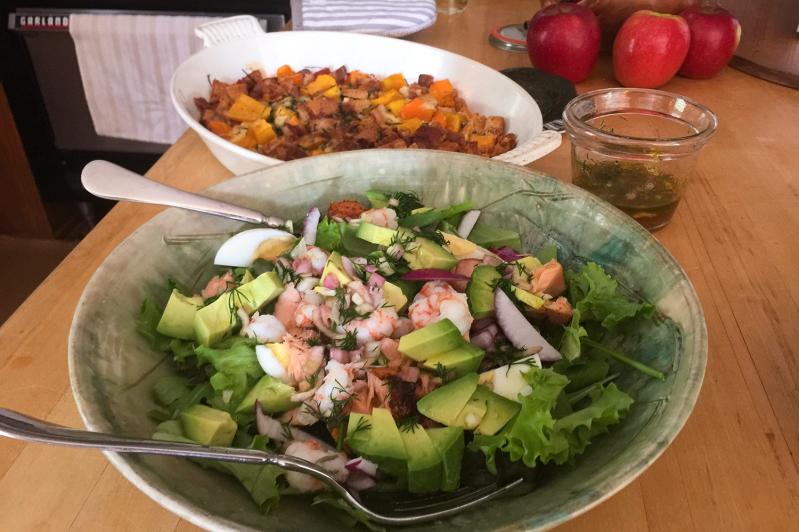I read an article the other day that claimed that if everyone gave up meat and dairy (animal products) at breakfast time, the environment could be improved by 20 percent. This seemed to be a staggering statistic. Then I considered everything that must be given up: yogurt with your granola and fruit, a dab of butter for your toast, a splash of milk in your coffee, no eggs, no cheesy omelets or frittatas, no bacon or ham. I barely eat breakfast, but this suggestion seems daunting nonetheless.
A similar theory is espoused in Jonathan Safran Foer’s new book “We Are the Weather: Saving the Planet Begins At Breakfast.” He proposes that we eliminate animal products from our diet for two meals per day. By so doing, he calculates, we could save 1.3 metric tons of carbon dioxide emissions per person per year, of the estimated 7,516 million tons of CO2 emissions that livestock produce per year.
This all got me to thinking about how hard I try to eat right, support localism, reduce waste, walk instead of drive, and how ultimately I fail to do as much as I possibly can, food-wise. Here’s the thing: I love food too much to content myself with a winter C.S.A. of rutabagas, alliums, and gnarly greens. Sometimes I want a can of hearts of palm for a salad, or some shrimp for a cocktail appetizer, or fresh artichokes OUT OF SEASON! I eat very little meat, but I don’t think I could ever give up a little sliver of Reblechon or Taleggio cheese to go with a tart salad and crisp baguette.
So now I have come to think of the naughty, naughty, out-of-season, or carbon-footprint-the-size-of-Sasquatch foods as “cheats.” If you look up “food cheats,” basically you will get thousands of articles aimed at dieting women. That is a sad story for another day. That is not what I am talking about.
Here are the biggest culprits when it comes to greenhouse gas emissions, (a.k.a. lamb burps). Beef, lamb, farmed or overfished seafood, almonds and almond milk, palm oil, bottled water, coffee, sugar, and fast food. Okay, I eat very little beef and lamb, I’ve always thought tilapia was awful, and I’m mindful of overfishing. Almond milk is dumb, I can read labels and avoid palm oil, I switched to a Brita filter and Soda Stream years ago. Coffee I cannot give up, sugar is easily avoided and/or reduced, and fast food doesn’t even exist out here beyond the Burger King and McDonald’s in Southampton. So why do I still feel so guilty?
Having been raised Catholic, I have even begun calculating the degrees of sinfulness with my food purchases. Surely buying a plastic container of pre-cut pineapple is only a venial sin, whereas chowing down on a rich slab of foie gras followed by rack of lamb is a mortal sin? Apparently, if I believed that the plastic container was biodegradable corn matter, I am less guilty and still living a life of grace. I’m still eating that sweet tropical treat that had to travel from so far away just for me.
Another major form of food cheat that I cannot get behind is the delivery systems — meal kits and Peapod and the like. I can appreciate the necessity for certain people, shut-ins for whatever reason, a new baby in the house, an injury, old age, or just plain too busy to buy your own food. But when I see a huge refrigerated semi-trailer truck blocking the narrow streets of Sag Harbor, I think of how much farther away from the source this takes us.
A friend used a meal service for a few months, and I had the opportunity to experience the guided, pre-measured, pre-prepared meal situation with him. The amount of plastic used for a tablespoon of this, dab of that, soupçon of whatever, was appalling.
I have another friend who blasts the air-conditioning with doors ajar in summer, and blasts heat in winter with the windows open. The family keeps two fireplaces blazing throughout the day and all the house lights will be left on after bedtime. However, she is adamantly opposed to plastic straws and often declares her solutions to this enormous environmental threat. Bless her heart.
Some food cheats are more like hacks; for instance, buying pre-made mashed potatoes at the IGA, or Peter Luger’s creamed spinach. The former is good, the latter not, I just discovered. So if you’re going to cheat, perhaps try to do it more mindfully and make up for it in other ways, as in composting or recycling or just reducing your food waste in general.
I am going to try harder to help the environment, and I hope that it is forgivable for me to indulge a constant need for fresh citrus in the house, the occasional filet of red snapper, and splurge on a basket of fresh raspberries in darkest February.
This first salad uses almost all local or homegrown ingredients, the second is more exotic.





